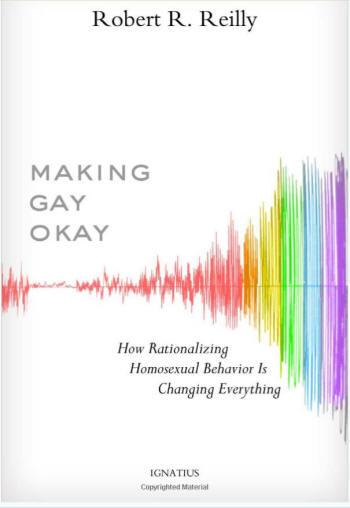Catholic Medical Quarterly Volume 66(4) Nov 2016
Book Review
Making Gay Okay:
How Rationalising Homosexual Behaviour is
Changing Everything
Robert R. Reilly
Ignatius Press
ISBN: 978-1586178338 (Hardback -
30 Apr 2014)
ISBN: 978-1621640868 (2nd Edition [Paperback] 5 Sep 2015
 Robert
R. Reilly is a senior fellow of the American Foreign Policy Council,
university professor, former broadcaster and professional actor, advisor
to President Reagan and army officer, and a distinguished commentator on
social, cultural and political issues. His latest book examines the
homosexual agenda, how it became part of the mainstream of American
society and traces the aggressive homosexual ‘march through the
institutions'.
Robert
R. Reilly is a senior fellow of the American Foreign Policy Council,
university professor, former broadcaster and professional actor, advisor
to President Reagan and army officer, and a distinguished commentator on
social, cultural and political issues. His latest book examines the
homosexual agenda, how it became part of the mainstream of American
society and traces the aggressive homosexual ‘march through the
institutions'.
According to Reilly, the debate about homosexuality, and particularly about same-sex marriage, is, at its heart, a debate about the nature of reality. One side believes that things have a nature and purpose that make them what they are. The other side denies that things have an essential nature, and believes that things are nothing in themselves, and can be shaped according to personal choices and desires. Reilly examines the philosophical basis for these competing points of view.
Having established the philosophical bases for the opposing worldviews, he sets about comprehensively dismantling gay rights mythology. Drawing upon research evidence, he thoroughly discredits the idea that homosexual relationships are, in the words of Nick Clegg, ‘normal and harmless'. According to the American psychiatrist Jeffrey Satinover, the incidence of AIDS among homosexual men in their 20s and 30s is around 430 times greater than that of the heterosexual population at large.
While men who have sex with men are a tiny percentage of the population, they account for 72 per cent of syphilis cases, 79 per cent of HIV diagnoses among men and a significant percentage of other sexually transmitted infections. Reilly asks: ‘Why are there no warning labels?...How is it that there can be warning labels on cigarettes and alcohol, on almost every package of food... yet no cautionary admonitions regarding homosexual practices?'
Promiscuity
Reilly demonstrates that the image promoted by the gay lobby of the committed gay couple in a stable relationship is largely a myth. Less than 8 per cent of both male and female homosexual relationships can be described as ‘long-term'.
A study by two homosexual authors of 100 gay couples who had been together for five years or more, found that not a single one had maintained sexual fidelity. An Australian study of 2,583 sexually active homosexual men found that 82 per cent had had over 50 sexual partners while nearly 50 per cent had over 100. In the words of the influential journalist, broadcaster and homosexual rights activist, Michaelangelo Signorile: ‘For “gay” men, the term monogamy simply doesn't necessarily mean sexual exclusivity.'
The institutions of society
In the second half of the book, Reilly describes the gay lobby's ‘march through the institutions' of American society:
- the social science, psychiatry and psychology professions have been deeply influenced by homosexual ideology;
- children in school are exposed to literature featuring children with two mothers or two fathers;
- practising homosexuals now serve openly in the US military;
- under the Obama administration the promotion of ‘LGBT rights' around the globe has become a stated goal of US foreign policy.
Same-sex parenting
Reilly then proceeds to counter the arguments for same-sex parenting and argues that claims that children do just as well when raised by two parents of the same sex have ‘no credible science to support them'. He cites an Australian study which found that children raised by their natural mother and father in marriage do better at school in both academic and social terms than those of cohabiting or same-sex couples.
The New Family Structures Study conducted by Professor Mark Regnerus of the University of Texas found that ‘even after including controls for age, race, gender, and things like being bullied as a youth, or the gay-friendliness of the state in which they live', those raised by same-sex parents were:
depressed,...smoke more pot,...report more male and female sex partners,...and were more likely to reflect negatively on their childhood family life...’
A statement by the American College of Pediatricians opposing same-sex parenting declares:
‘Research has demonstrated considerable risks to children exposed to the homosexual lifestyle. Violence between same-sex partners is two to three times more common than among married heterosexual couples. Same-sex partnerships are significantly more prone to dissolution than heterosexual marriages, with the average homosexual relationship lasting only two to three years.
‘Homosexual men and women are reported to be promiscuous, with serial partners, even within what are loosely termed “committed relationships”.
‘Individuals who practice a homosexual lifestyle are more likely...to experience mental illness, substance abuse, suicidal tendencies and shortened life-spans.
‘Although some would claim that these dysfunctions are a result of societal pressures in America, the same dysfunctions exist at inordinately high levels among homosexuals in cultures where the preferable practice is more widely accepted...’
Reilly also includes a number of testimonies of individuals raised by
same-sex parents showing the negative effects this had on them.
Revolution
Robert Reilly has produced an excellent chronicle of what might be called the ‘homosexualist revolution' illustrating how the movement has ingeniously achieved its goals through infiltrating every national institution and making those institutions tools for promoting the acceptance of homosexual behaviour. His findings are supported by solid research evidence. This book will provide defenders of traditional marriage and parenthood with a wealth of useful material with which to counter the claims of the homosexual lobby.
This review reprinted and first published by the Family Education Trust.
Reviewed by Piers Shepherd
